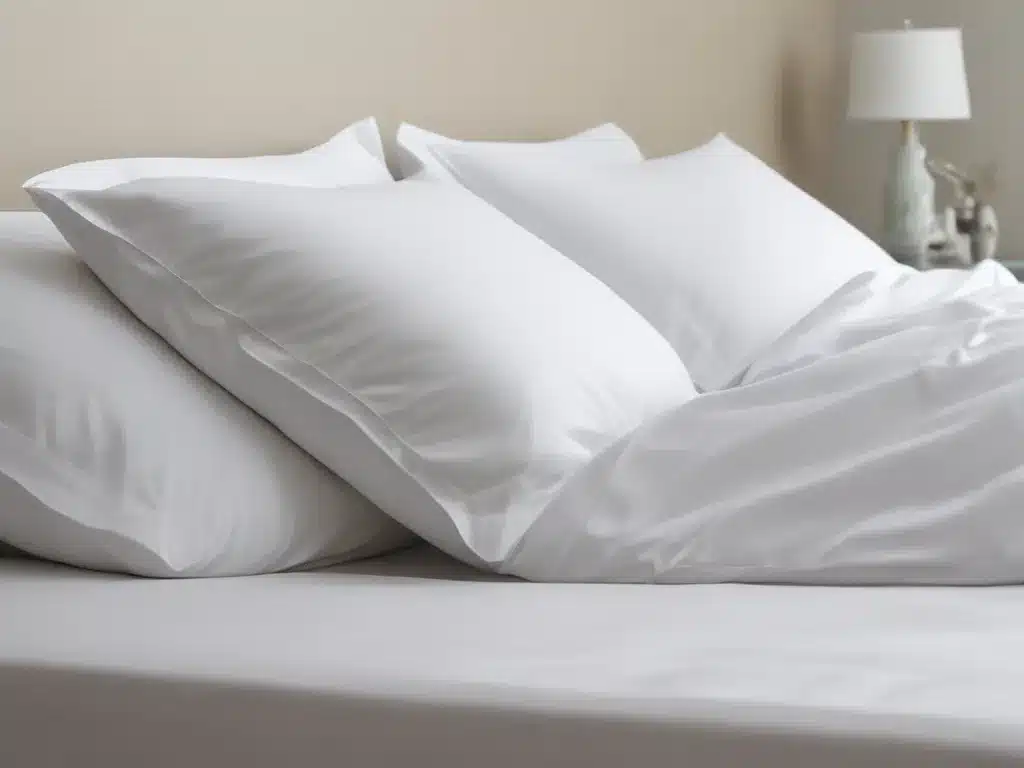Introduction
Ah, the age-old question: how often should one change their sheets? It’s a conundrum that has perplexed humanity for centuries. Well, fear not, dear reader, for I shall dive deep into this topic and provide you with a comprehensive guide that will leave no thread (pun intended) unturned.
The Importance of Clean Sheets
Clean sheets are more than just a luxury; they’re a necessity for maintaining a healthy and hygienic living environment. The bed is a breeding ground for all manner of undesirable guests, including dust mites, dead skin cells, and even the occasional stray crumb or two (we’ve all been there).
Neglecting to change your sheets can lead to a host of unsavory consequences. Dust mites, for instance, thrive in warm, humid environments and can exacerbate respiratory issues like asthma and allergies. Additionally, the buildup of sweat, oils, and other bodily fluids can create an ideal environment for bacteria and fungi to flourish, potentially leading to skin irritations or infections.
Factors to Consider
When determining the optimal frequency for changing your sheets, several factors come into play:
-
Personal Habits: Do you have a tendency to sweat profusely at night? Do you enjoy a midnight snack in bed? Do you share your bed with a furry friend? These habits can all contribute to the faster accumulation of grime and allergens on your sheets.
-
Health Conditions: Individuals with conditions like eczema, allergies, or compromised immune systems may benefit from more frequent sheet changes to minimize exposure to potential irritants or pathogens.
-
Climate: Living in a humid or warm climate can accelerate the growth of bacteria and fungi, necessitating more frequent sheet changes.
-
Number of Occupants: The more individuals sharing a bed, the more quickly the sheets will accumulate bodily fluids and debris, requiring more frequent changes.
The Recommended Schedule
Now, for the moment you’ve all been waiting for: the recommended schedule for changing your sheets. Drumroll, please…
Weekly
For most individuals leading a relatively tidy lifestyle, changing sheets once a week is a reasonable guideline. This frequency helps maintain a fresh and hygienic sleeping environment while accommodating the natural buildup of oils, sweat, and dead skin cells.
Twice a Week
If you find yourself falling into one or more of the “high-risk” categories mentioned earlier (e.g., heavy sweating, allergies, shared bed), consider upping the ante and changing your sheets twice a week. This extra bit of diligence can go a long way in mitigating potential health issues and ensuring a comfortable night’s slumber.
Every Two Weeks
For those with a more minimalist lifestyle or who live in cooler, drier climates, changing sheets every two weeks may be sufficient. However, it’s important to remain vigilant and adjust this schedule as needed based on personal circumstances.
The Art of Sheet Changing
Changing sheets may seem like a straightforward task, but there’s an art to doing it efficiently and effectively. Here are a few tips to help you master the art of sheet changing:
-
Strip the Bed Completely: Remove all bedding, including the mattress protector (if applicable), to ensure a thorough cleaning.
-
Wash in Hot Water: Hot water is more effective at killing bacteria, fungi, and dust mites than cold water. Remember to follow the care instructions on your bedding to avoid any damage.
-
Dry Thoroughly: Damp or partially dried sheets can create a breeding ground for mold and mildew. Ensure your sheets are completely dry before making the bed.
-
Freshen Up: Consider using a lightly scented laundry detergent or fabric softener to add a fresh, inviting aroma to your bedding.
-
Rotate Your Sheets: Alternate between different sets of sheets to extend their lifespan and ensure a consistent supply of clean bedding.
The Benefits of Clean Sheets
Maintaining a regular sheet-changing routine not only promotes good hygiene but also offers a host of other benefits:
- Better Sleep Quality: Clean, fresh sheets can contribute to a more comfortable and restful sleep experience.
- Improved Skin Health: Reducing exposure to bacteria, fungi, and allergens can help prevent skin irritations and breakouts.
- Respiratory Relief: For those with allergies or asthma, regularly changing sheets can alleviate respiratory symptoms by minimizing exposure to dust mites and other irritants.
- Stress Reduction: There’s something inherently calming about slipping into a freshly made bed with crisp, clean sheets – a simple pleasure that can help alleviate stress and promote relaxation.
Conclusion
In conclusion, the frequency with which you should change your sheets depends on various factors, including personal habits, health conditions, climate, and the number of occupants. While a weekly or bi-weekly schedule may suffice for most, it’s essential to remain vigilant and adjust as needed to maintain a hygienic and comfortable sleeping environment.
Remember, changing your sheets is more than just a mundane chore; it’s an investment in your overall well-being and a small act of self-care that can have a profoundly positive impact on your quality of life. So, embrace the art of sheet changing, and revel in the simple joy of slipping into a freshly made bed – it’s a luxury that’s well worth the effort.







